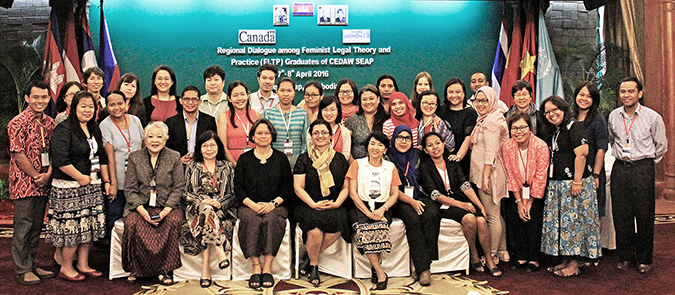Regional Dialogue on Feminist Legal Theory and Practice (FLTP) graduates of CEDAW SEAP
Event description

With their ratification of CEDAW, Southeast Asia countries have an obligation to take steps to eliminate discrimination against women and girls on the basis of gender and ensure substantive equality. A common manifestation of inequality is in laws. A review of several laws in South East Asia exhibits direct and indirect discriminatory clauses against women. The existence or absence of laws in some areas of women’s lives are another challenge in eliminating discrimination. Legal protections and policies are varied across Southeast Asia. While domestic violence laws in several countries have improved, some countries are yet to develop comprehensive laws on violence against women, especially covering women in specific situations of vulnerability to violence. Family laws, including marriage, divorce, custody laws routinely discriminate against women. Freedom of movement for some women, of sexual autonomy and reproductive rights are also often curtailed by regressive laws and practices despite some advances in some countries. Law and justice systems both nationally and regionally, have been a focus of CEDAW SEAP because women have recognized both the potential and failings of it. In cases where laws are missing or discriminatory or broke, ending discrimination against women means more than simply helping women to access the existing justice system. Equality and equity are also conflated as interchangeable concepts. This leads to measures of equality stopping at formal equality and not translating into substantive equality outcomes for women.
Many countries have few lawyers, policy makers with the knowledge and skills to advance women’s rights from the perspective of substantive equality, and other principles enshrined in CEDAW. Where laws exist, due to intrinsic stereotypes, cultural norms, internalised by duty bearers and rights holders alike, legal interpretations remain limited. Many lawyers and para-legal professionals are not equipped to challenge and critique discriminatory laws and practices from feminist and rights perspective or to use human rights standards in their work. A stronger pool of knowledgeable legal advocates are required who can collaborate across the region and share challenges and knowledge... Read more